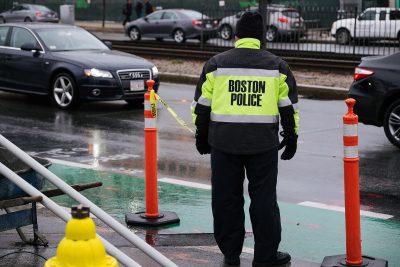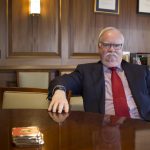
The American Civil Liberties Union canceled a Tuesday protest against the Boston Police Department’s use of social media surveillance software, after BPD announced it will reconsider the use of social media scanners, according to the ACLU of Massachusetts.
The ACLU had invited Boston residents to join them and the digital freedom organization Fight for the Future in delivering messages to Boston Mayor Martin Walsh, urging him and the BPD to rethink the plan to spend $1.4 million on a new social media surveillance system, according to a press release from the ACLU.
“Dragnet surveillance does not protect public safety, but threatens civil rights and civil liberties, chills speech, and provides another forum for the over-policing of Black and brown Bostonians,” Kade Crockford, director of the Technology for Liberty Program, said in the release.
On Jan. 13, four days before the ACLU’s protest was scheduled to happen, the BPD announced its decision to redraft its request for proposals from social media analytic technology developers.
“After reviewing the submitted proposals I felt that the technology that was presented exceeds the needs of the department,” BPD Commissioner William Evans said in a statement. “I met with Mayor Walsh and with his support we have decided not to enter into a contract at this time.”
Evans has also asked City Councilor Andrea Campbell, who chairs the Committee on Public Safety and Criminal Justice, to initiate a public process, encouraging feedback from residents on technology related issues, according to a release from the BPD.
Crockford told The Daily Free Press that the release prompted the ACLU to cancel its Tuesday protest, as they feel their efforts have been heard by local politicians and law enforcement.
“It’s pretty clear that the people of Boston spoke and they opposed the plan, and they’ve stopped it,” she said. “That’s how the system should work … we have an example here in Massachusetts of the democratic process functioning the way it’s supposed to.”
Crockford said once the new proposal is released, the ACLU will analyze it to determine whether they need to take action again in order to help preserve the rights of social media users in Boston.
“The city has said they intend to pursue a new request for proposal that describes the more limited type of social media monitoring,” Crockford said. “And we will definitely pay close attention to that when that RFP is released; we’ll be reading it, analyzing it.”
Crockford said the ACLU expects to be involved Campbell’s public process meetings and will decide whether or not further action is needed based on how the meetings progress.
“If necessary, we will again call on the people of Boston to reach out to their elected officials to voice their concerns about either the RFP or the policies or procedures proposed by the Boston Police Department,” Crockford said.
Several Boston residents showed support for the BPD’s use of social media scanners.
Edward Kim, 30, of Back Bay, said he would feel more protected ift the BPD were scanning social media for trigger words.
“I don’t really have anything embarrassing on my social media, and that may come from a very selfish perspective, but I would feel safer,” he said.
Christine Gleson, 20, of Fenway, said she feels comfortable with police using social media scanners for safety reasons, but she understands why they might seem invasive.
“Because I have the luxury of being very private on my social media, I would know that I have nothing to hide, but on the other hand, I know that sometimes things can be wildly misinterpreted,” Gleson said. “I would say it varies from case to case, but sometimes preventive measures make sense.”
Evan McIntyre, 48, of Brighton, said people should be expecting this kind of monitoring when they create their social media accounts.
“When you open a Facebook account, you should know that people are going to have a lot of information about you,” he said. “So if you want privacy I would suggest not getting on social media.”




